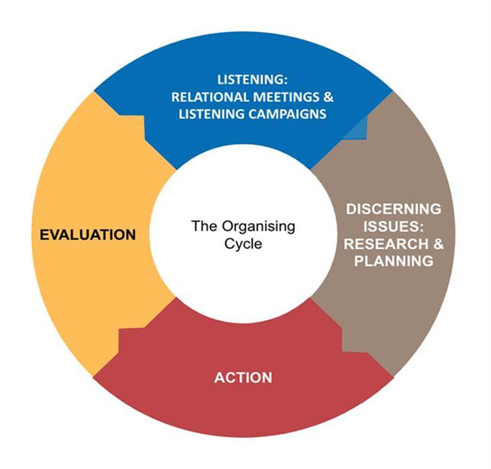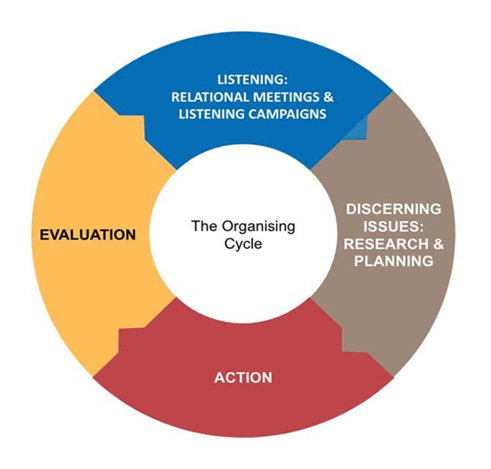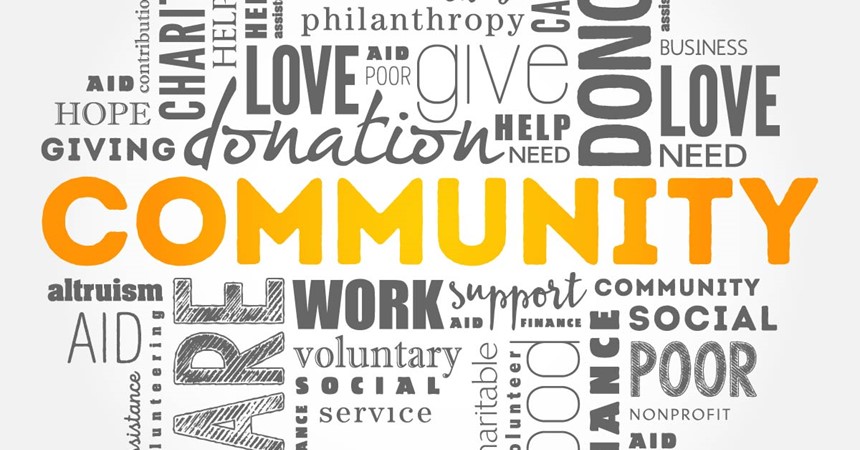The Diocese of Maitland-Newcastle is a member of the Hunter Community Alliance which brings together diverse community organisations - environmental groups, unions, First Nations people, ethnic and cultural groups, and organisations from the welfare and health sectors, as well as religious bodies to advance the common good and achieve fair, just and sustainable cities and regions. Its purpose is to build the power and influence of community organisations which share similar values and motivations.
At the end of last week, I assisted with the training for the Hunter Community Alliance. We use an organising model to build a relational community which uses the following cycle:
- Listen
- Discern
- Act
- Evaluate


This follows the Pastoral Cycle of See Judge and Act, developed by Cardinal Joseph Cardijn in the 1920’s, and I trust you can see our synodal cycle and the work of the Plenary Council.
I then came across the following article by Andy Frost, in Premier Christianity Magazine. On 5 July 2022, he wrote about the Mayor of Manchester, Andy Burnham, who wants the Church to be ‘more ambitious’.
In his address to a gathering of Christian leaders in Salford last week, the Mayor of Manchester Andy Burnham praised the Church’s community work, but urged leaders to be “more ambitious”. Andy Frost agrees the Church has a unique opportunity to help the nation recover from COVID. Here’s what that might look like.
“We have underestimated how much the last few years have taken out of us,” said Andy Burnham, former Labour health secretary and now mayor for Greater Manchester. “We’re not in a year of recovery, we’re in a decade of recovery,” he told delegates at the Gather Movement in Salford last week, as he urged church groups to work in unity, together with civic authorities, for the common good.
During the pandemic, the Church played a vital role in providing emergency food, befriending the lonely and stepping into the multiple gaps that appeared as COVID took hold. With a building in almost every electoral ward in the UK, a Disclosure and Barring Service (DBS) checked volunteer force and a desire to make a difference in our communities, the Church is here for the long haul. And, over the last few years, various political leaders have begun to recognise the role we can play.
With the number of critical issues facing our nation right now – a mental health pandemic, rising food poverty, chronic loneliness and the cost of living crisis there is an understanding that central government simply cannot do it alone, and neither can local authorities. Corporate challenges need a corporate response - and that includes the Church.
Andy Burnham was clear that we cannot put a value on the enormous role the Church plays in society in terms of emotional and spiritual care. His challenge was to “be more ambitious in what you are doing.”
But the question is, how do we do this?
Two weeks ago, I had the privilege of speaking at the civic prayer breakfast at Lincoln Cathedral. The room was packed with civic, business and educational leaders who want their city to thrive. I opened by talking about our shared vision to see people and communities flourish. But, in order to see this happen, I explained that there were three hurdles we needed to overcome.
-
- Presumptions
From the civic perspective, there can be a presumption that the Church is out of date and out of touch. Talking to a local leader, she couldn’t comprehend that Christians would have smartphones! There was a presumption that the Church is full of geriatrics who only meet once a week on a Sunday, and that we are out to aggressively proselytise everybody.
But from the Church perspective, we can also be presumptive. We can assume civic leaders don’t like us, or that they are far too busy to talk with us. We need to build bridges across the divide.
Great collaborations between civic institutions and the Church begin with listening. There are countless stories across the UK where a meeting has been called and church leaders have simply asked: “What are the biggest issues you are facing? How can we help meet those needs?”
-
- Culture and language
Civic institutions love their acronyms. It can be confusing to wrap our heads around what VCSO or KPI stand for (it’s Voluntary and Community Sector Organisations, and Key Performance Indicators, in case you’re interested). But the Church is often as bad. We use terminology like ‘redemption’ and ‘ministry’ that can mean little to outsiders. And depending on your denomination, we use a bewildering array of titles: vicars, pastors, reverends, fathers, bishops, deacons, canons, curates, rectors, priests, ministers, chaplains and lay leaders… very confusing!
Overcoming these cultural and language issues requires humility, as well as the vulnerability to ask questions and bring clarity. Collaboration is built around relationships.
-
- A coordinated response
Civic leaders can’t speak to every local church. They need a single point of contact who can communicate across the streams of church and bring people together. Too often, the Church can be uncoordinated and disorganised – and, as a result, we miss out on a seat at the table with the decision makers.
In the Bible, Paul writes to the churches in Ephesus, Rome, Philippi, Galatia, Thessalonika and Corinth. But he saw them as one Church. Although we have many different denominations, we need to humbly come together if we want to connect meaningfully with the civic sector. We need to take stock of what we are already doing and what capacity we have.
When this happens, it is incredible to see the results. In Bristol, church leaders meet regularly with the mayor, Marvin Rees. They get to hear the most pressing needs and, as a result, they have been able to respond to issues such as homelessness and adoption in powerful, tangible ways. In Ipswich, the churches are actively serving Ukrainian refugees after unifying around a call for help from the authorities. And in Lincoln, churches have collaborated to set up Night Light crisis cafes. 100 volunteers, trained in mental health first aid, are working with the NHS to support those who are struggling with mental health. There are similar stories from across the UK.
With Andy Burnham’s challenge to be more ambitious still ringing in my ears, it’s clear that the Church now has a unique opportunity. Burnham has seen the difference that it’s made in his local area. The opportunities for similar initiatives, right across the UK, are endless - but the ball is very much in our court. Will the Church stop and listen to the most urgent needs of our local communities? Will we build relationships that overcome jargon? Will we work to become more unified so that we can help our people and our places flourish?
This article explains beautifully the ongoing work of the Hunter Community Alliance in which churches gather with other civil society groups to listen to stories of private pain, for which there may be some public action for the common good. I invite you to explore more about this Alliance by visiting their website https://www.thehca.org.au/ or by phoning me. An initial step for an individual or parish to get involved would be to attend the two-day Foundations Training which is offered a few times each year.
Reflecting on this week’s Gospel reading from Luke 10:38-42, we are called to be both a Mary by listening deeply and a Martha by action, by good works and offering hospitality.

